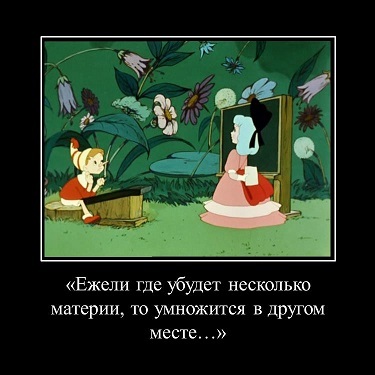A look into the future: on the road to digital communism
 The world has changed. But human psychology remained in the past century.
The world has changed. But human psychology remained in the past century.We used to live in the world of matter and energy, and now we live in the world of information.
"... -We will do arithmetic ... You have two apples in your pocket ... Pinocchio slyly winked:" You're lying, not one ... "I say," the girl patiently repeated, "suppose you have two apples in your pocket. Someone took one apple from you How many apples are left? .. "
')
The correct answer, of course, is one apple.
Consider another situation.
"... -We will do arithmetic ... You have two knowledge in your head ... Pinocchio slyly winked:" You're lying, not one ... - I say, - the girl patiently repeated, - suppose you have two knowledge in your head. Someone took one knowledge from you How much knowledge do you have left? .. "
But in this case, the correct answer is two knowledge.
Because in the information world the law of conservation does not work: “if where some matter diminishes, it will multiply in another place ...”. Because information is not matter, and not energy. Unlike the production of, for example, automobiles, one more copy of information for the manufacturer does not cost anything.
Therefore, digital piracy will die because the copyright institution will die. And the institute of copyright will die because it is a crime against humanity and civilization - the deliberate concealment of information and its highest form - knowledge. This is an absurdity, if for using the Einstein mass and energy equivalence formula in its solution, it is necessary to purchase a license or patent.
Therefore, in the future we are waiting for "digital communism": from each according to his ability, to each according to his needs. Free software, Wikipedia, Habr - these are just some examples of movement in this direction.
The future is freedom - Creative Commons "Attribution" 3.0 , according to which you can freely:
- Share (share) - copy and distribute material on any medium and in any format.
- Adapt (create derivative materials) - make remixes, modify, and create new, relying on this material for any purpose, including commercial ones.
- The licensor does not have the right to annul these freedoms while you fulfill the license conditions.
The thesis “to each according to needs” raises no questions. But where will those who "from each according to his ability" come from?
Many have read and heard about the pyramid of Abrahamson Maslow, but not all, perhaps he knows that in his last works he left only two levels from the pyramid: the needs of self-actualization and all the others that he called deficient. And if satisfied by about 80% of the deficit needs cease to motivate a person, then existential needs can motivate a person indefinitely. Maslow claims [A. Maslow. “New Frontiers of Human Nature”, M., Smysl, 1999], that “each of us has an impulse to self-improvement, to more fully translate our capabilities into reality, to self-actualization, or to full humanity, or to self-realization”. Moreover, he is convinced that today only self-actualizing people can be considered completely psychologically healthy. Einstein once remarked that one who feels his life devoid of meaning is not only unhappy, but also hardly viable.
That is why 3,711 people contributed to the development of the Linux kernel versions 3.15-4.0; 1,400 regular contributors to Wikipedia articles; 1,500 new topics are posted monthly and 70,000 new comments are posted on Habré.
UPD. Another good example of moving towards digital communism: Inside OpenAI, Elon Musk's Artificial Intelligence
I want to believe that in the future all socially significant intellectual products will be distributed in the form of open source software or free copies, applications and services.
Source: https://habr.com/ru/post/279975/
All Articles